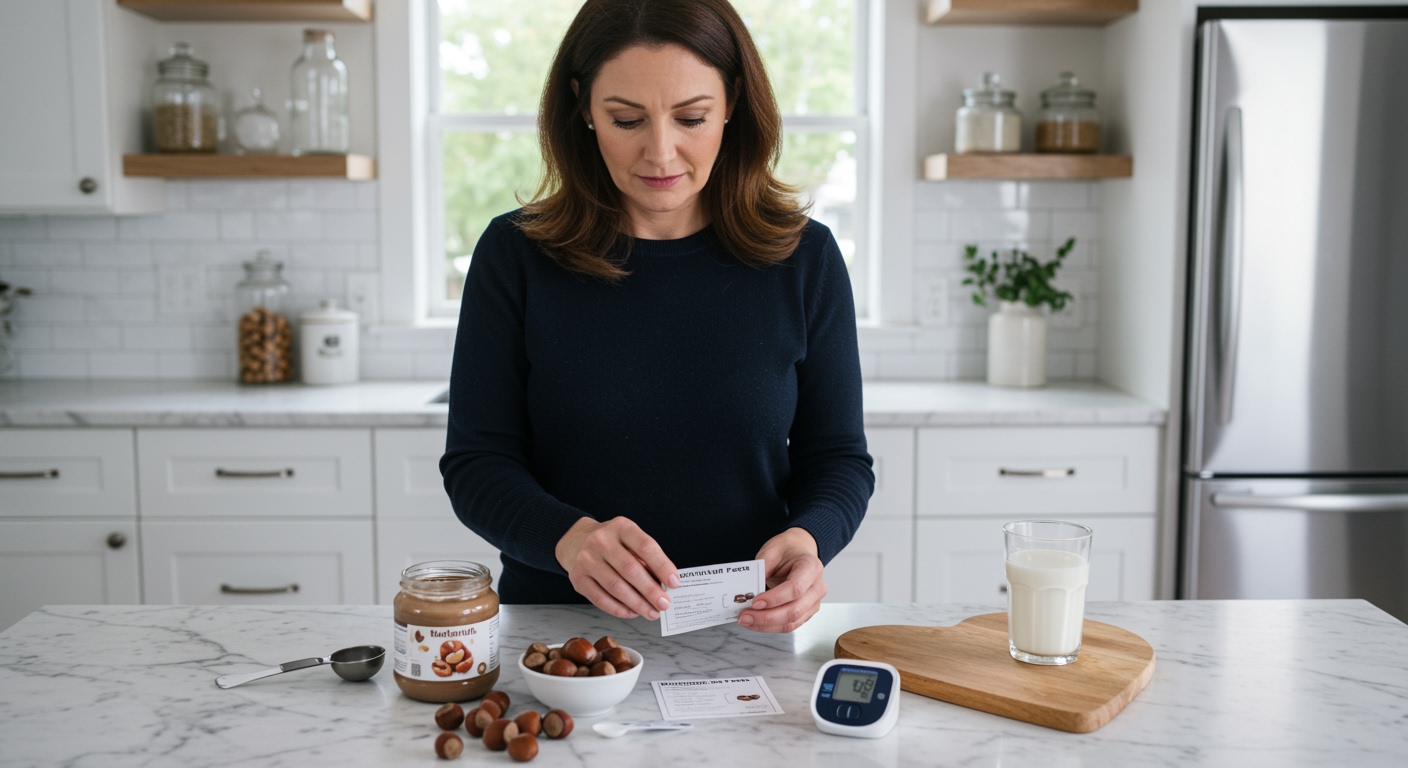✪ Key Takeaway: Commercial hazelnut cream can raise blood pressure due to high sodium, sugar, and saturated fat content.
Introduction
Your morning coffee ritual just got complicated.
You might be wondering if that creamy hazelnut addition to your daily cup could be silently affecting your blood pressure readings.
Hi, I’m Abdur, your nutrition coach and today I’m going to explain exactly how hazelnut cream affects your blood pressure and what you need to know to make informed choices.
What Makes Hazelnut Cream Different From Regular Hazelnuts?
Raw hazelnuts are actually heart-healthy nuts that can help lower blood pressure naturally.
These nuts contain magnesium, potassium, and healthy monounsaturated fats that support cardiovascular health.
However, commercial hazelnut cream transforms these beneficial nuts into something completely different.
The manufacturing process adds sugar, palm oil, skim milk powder, and sodium to create that smooth, spreadable texture you love.
These added ingredients change how your body responds to the product.
While hazelnuts make up only 13% of most commercial hazelnut creams, the remaining 87% consists of processed ingredients that can negatively impact blood pressure.
✪ Fact: Most commercial hazelnut spreads contain more sugar and palm oil than actual hazelnuts.
How Does Sugar Content Affect Your Blood Pressure?
Two tablespoons of hazelnut cream contain approximately 21 grams of sugar, which equals about 5 teaspoons.
This sugar load triggers a rapid spike in your blood glucose levels.
Your body responds by releasing insulin to manage this glucose surge.
High insulin levels cause your kidneys to retain more sodium, which increases blood volume and raises blood pressure.
Additionally, frequent sugar spikes lead to inflammation in your blood vessels.
This inflammation makes your arteries less flexible and forces your heart to work harder to pump blood.
Regular consumption of high-sugar foods like hazelnut cream can contribute to chronic hypertension over time.
✪ Pro Tip: Limit hazelnut cream to occasional treats rather than daily consumption to protection your cardiovascular health.
Why Does Sodium Content Matter For Blood Pressure?
Commercial hazelnut cream contains sodium as a preservative and flavor enhancer.
Even small amounts of added sodium can impact people who are sensitive to salt.
When you consume sodium, your body holds onto extra water to dilute the salt concentration in your bloodstream.
This extra fluid increases the volume of blood your heart must pump, raising blood pressure.
Your kidneys play a crucial role in this process by regulating how much sodium and water your body retains.
If you already consume a high-sodium diet, adding hazelnut cream can push you over the recommended 2300 milligrams daily limit.
People with existing high blood pressure should be especially careful about hidden sodium sources in processed foods like hazelnut cream.
✪ Note: Check ingredient labels for sodium content, as amounts can vary significantly between brands.
Can Saturated Fat From Palm Oil Raise Blood Pressure?
Palm oil is the second most common ingredient in commercial hazelnut cream after sugar.
This saturated fat contributes to elevated cholesterol levels when consumed regularly.
High cholesterol leads to plaque buildup in your arteries, a condition called atherosclerosis.
As plaque accumulates, your arteries become narrower and less flexible.
Your heart must pump harder to push blood through these restricted pathways, resulting in higher blood pressure.
Two tablespoons of hazelnut cream provide about 3.5 grams of saturated fat, which represents roughly 18% of your daily recommended limit.
Combined with other sources of saturated fat in your diet, this can quickly add up to excessive levels that impact cardiovascular health.
✪ Fact: Palm oil contains 50% saturated fat, making it one of the most saturated plant-based fats available.
Are There Better Alternatives For Blood Pressure Management?
If you love hazelnut flavor but want to protection your blood pressure, several healthier options exist.
Raw hazelnuts provide the same delicious taste without added sugar, sodium, or palm oil.
You can make your own hazelnut butter by blending roasted hazelnuts with a small amount of heart-healthy oil like olive oil.
This homemade version retains the beneficial magnesium and potassium that actually help lower blood pressure.
Another option is to use unsweetened hazelnut milk in your coffee instead of hazelnut cream.
You can also add a small amount of pure hazelnut extract to your regular coffee creamer for flavor without the blood pressure risks.
These alternatives let you enjoy hazelnut taste while supporting your cardiovascular health goals.
✪ Pro Tip: Blend raw hazelnuts with dates for natural sweetness without refined sugar or added sodium.
The Bottom Line
Commercial hazelnut cream can indeed affect your blood pressure due to its high sugar, sodium, and saturated fat content.
Your health is worth more than a moment of sweet indulgence, and making informed choices about processed foods protects your long-term cardiovascular wellness.
I would love to hear about your experiences with hazelnut cream or any questions you might have about managing blood pressure through nutrition, so please share your thoughts in the comments below.
References
At NutritionCrown, we use quality and credible sources to ensure our content is accurate and trustworthy. Below are the sources referenced in creating this article:
- Healthline: Hazelnut Benefits
- PubMed: Nuts and Cardiovascular Health
- WebMD: Health Benefits of Hazelnuts
- PMC: Dietary Fats and Blood Pressure





